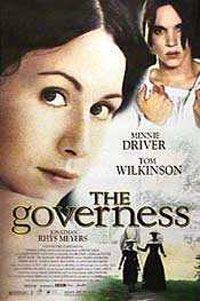Critical response
The film debuted at the Seattle International Film Festival before going into limited release in the US. On its opening weekend it grossed $57,799 in six theaters. Its total box office in the US was $3,719,509. [3] The film received positive reception from critics, especially for Driver's performance as Rosina da Silva.
In his review in The New York Times , Stephen Holden called the film "ravishingly handsome" and added, "The Governess is a wonderful showcase for Ms. Driver . . . If [her] performance is strong, it is less than great, because her face lacks the transparency of expression that would transport us inside her character's mind . . . The movie takes some missteps. Rosina's ability to support her family in luxurious style from her earnings as a governess is implausible. The screenplay includes some glaring lapses into contemporary slang. And dramatically, the movie peters out in its disappointingly perfunctory final scenes. But [it] still leaves a lasting after-image." [6]
In Variety , Ken Eisner called the film "beautifully crafted" and said it "gets high marks for originality and style," then added, "Although first-time helmer Sandra Goldbacher, working from her own script, has come up with a fascinating premise, her follow-through is too scattered in concept and monotonous in execution to be truly rewarding . . . [It] has much to offer the senses . . . but the images are often art-directed to death, with more attention paid to fabrics, textures and colors than to narrative coherence. A little trimming could remove some of the distractions and repetition, but it won't be easy to hide the movie's lack of a solid point or payoff." [7]
In Entertainment Weekly , Owen Gleiberman graded the film a C and called it "a have-your-kugel-and-eat-it-too princess fantasy. Writer-director Sandra Goldbacher glorifies her heroine at every turn, but she also fills the movie with arid pauses, turning it into a claustrophobic study in repression." [8]
Barbara Shulgasser of the San Francisco Examiner observed, "Sandra Goldbacher, writing and directing her first feature, is a sure-handed filmmaker. The movie is a tableau of sensuality. The tactile attractiveness of the photographic images meld with the fire that devours the lovers . . . I found the end of the movie a bit of an anticlimax and sense that Goldbacher just ran out of steam. But it seems a sure bet that she has many more movies ahead of her, all of which I look forward to seeing." [9]
Ruthe Stein of the San Francisco Chronicle said, "As Rosina's extraordinary fate unfolds in The Governess, the real wonder becomes how British filmmaker Sandra Goldbacher was able to write and direct such an accomplished, touching and original movie her first time out . . . Rosina is a wonderfully rich role, and Driver gives it everything she has. It's her best work yet." [10]
On the review aggregator website Rotten Tomatoes , 65% of 34 critics' reviews are positive. [11] Metacritic , which uses a weighted average , assigned the film a score of 60 out of 100, based on 25 critics, indicating "mixed or average" reviews. [12] Audiences polled by CinemaScore gave it a grade of B. [13]
